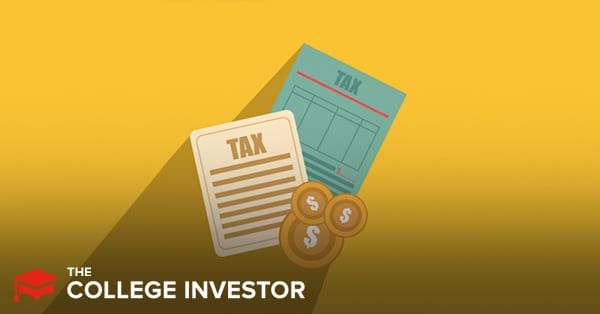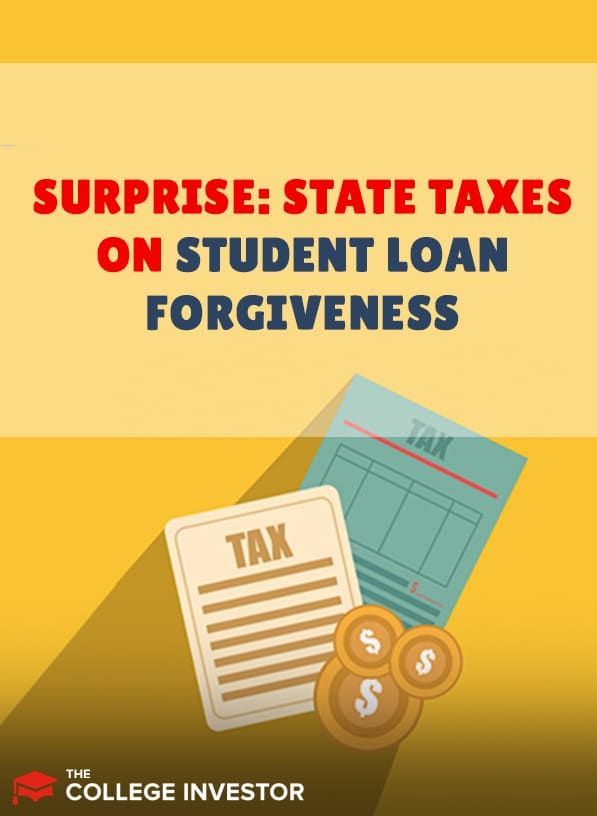
You may have heard the news - student loan forgiveness of any type is now tax free! And you might have always known that some programs like Public Service Loan Forgiveness were tax free, at least federally. But did you know that every state has a different law regarding state taxes on loan forgiveness?
The American Rescue Plan Act of 2021 added an exclusion from income on federal income tax returns for student loan forgiveness through December 31, 2025.
But what about state policies for taxing student loan forgiveness? Some states provide tax-free status for student loan forgiveness and some do not. This could be an unexpected tax bomb waiting for some Americans.
Overview
While student loan forgiveness is tax-free federally through December 31, 2025, it may not be tax-free on the state-level. In fact, prior to the American Rescue Plan Act of 2021, some student loan forgiveness programs were taxable on the federal level. See this guide to Federal taxes and student loan forgiveness.
Based on our research of state tax laws, you may still have to pay a "tax bomb" on student loan forgiveness to your state. In some states, the discharge of debt is considered taxable income. For example, if you have $10,000 in student loans forgiven, that amount gets added to your income, and you pay tax on the result.
Currently, we see the following:
- 11 states with no state income tax, so loan forgiveness is tax-free
- 20 states that automatically conform with federal tax rules, so loan forgiveness is tax-free
That leaves 19 states, where student loan forgiveness may or may not be tax free. Specifically, there may some types and/or timing of loan forgiveness that may be tax free, while other forms and/or timing are not.
As such, state taxes and loan forgiveness add a messy complication to student loan borrowers.
Find your state below and see what laws your state follows.
States With No Income Tax
Nine states provide tax-free status for student loan forgiveness because they do not have a personal income tax. These states include:
- Alaska
- Florida
- Nevada
- New Hampshire
- South Dakota
- Tennessee
- Texas
- Washington
- Wyoming
New Hampshire has a tax on interest and dividends, but not other income.
Related: Ultimate Guide To State Income Taxes
States That Automatically Conform With Federal Tax Rules
There are 20 states that base their definition of income on the federal definition of adjusted gross income (AGI) from the Internal Revenue Code of 1986, as amended, and automatically update their definition with changes in federal law.
Accordingly, changes in federal tax law, such as the new exclusion from income for student loan forgiveness, will automatically affect state income tax in these states. These states include:
- Connecticut
- Delaware
- Illinois
- Iowa
- Kansas
- Louisiana
- Maryland
- Massachusetts
- Michigan
- Missouri
- Montana
- Nebraska
- New Mexico
- New York
- Ohio
- Oklahoma
- Rhode Island
- Utah
- Vermont
- Washington, D.C.
Massachusetts and Michigan use a hybrid approach, with taxpayers being able to choose to use the federal AGI. In addition, Iowa has a subtraction for military student loan repayment.
New York does not consider distributions from 529 plans to repay student loans to be qualified. New York has an explicit subtraction for student loan death and disability discharges.
Three states base their definition of income on the federal definition of taxable income instead of AGI and automatically update their definition with changes in federal law. These states are Colorado, North Dakota and Oregon.
States That Conform With Federal Tax Rules As Of A Specific Date
There are several states that must pass laws to incorporate changes in the Internal Revenue Code of 1986 (IRC). Not all will.
Even when they do, the state laws may lag changes in federal law by a year or more. One must compare the date of the version of the IRC upon which the state tax law is based with the date upon which the tax-free status was enacted for various student loan forgiveness and discharges.
In effect, these states have decoupled their definition of income from the federal definition of income. Accordingly, these states do not automatically include the exclusion from income for student loan forgiveness from the American Rescue Plan Act of 2021.
Student loan forgiveness may be taxable in these states, depending on the date you receive student loan forgiveness and when the state changes the law.
States That Conform With The Federal Definition Of "AGI" As Of A Specific Date
There are 12 states that base their definition of income on the federal definition of adjusted gross income (AGI) as of a specific date. These states are:
- Arizona
- California
- Georgia
- Hawaii
- Indiana
- Kentucky
- Maine
- North Carolina
- Pennsylvania
- Virginia
- West Virginia
- Wisconsin
California provides tax-free status for the borrower defense to repayment and closed school discharges through December 1, 2024. California also provides tax-free status for death and disability discharges through January 1, 2026. Public service loan forgiveness is tax-free in California. Note: California is working on emergency legislation to conform on all loan forgiveness.
Maine provides a state income tax credit, the Opportunity Maine Tax Credit, to reimburse student loan payments for recent college graduates who live and work in Maine. Maine also provides a subtraction for student loan payments made by the borrower’s employer under the Maine Educational Opportunity Program (FAQ).
Employer student loan repayment assistance programs (LRAPs) are taxable in North Carolina in 2020.
Pennsylvania provides tax-free status for student loan debt that is forgiven via a state or Federal program that provides for payment or cancellation of student loans when the work is done for a period of time in a specified profession as of 2021. This would include Public Service Loan Forgiveness (PSLF) and LRAPs like the Student Loan Relief for Nurses (SLRN) program. See the updated tax bulletin here.
Virginia recently updated their definition of taxable income to conform to the IRS IRC as of December 31, 2021. This means that as of January 1, 2022, student loan forgiveness is excluded from taxable income through December 31, 2025. See this updated tax bulletin.
Wisconsin specifically excludes from income total and permanent disability (TPD). It also appears to exclude PSLF, since PSLF exclusion appears in 26 USC 108(f)(1) - which is the same section as TPD. However, Wisconsin has elected to INCLUDE any debt forgiven under the "special timeframe of December 20, 2020 through January 1, 2026" under IRC sec. 108(f)(5). This means that debt forgiven under this section, like income-driven repayment plans" is included income.
Arizona does not have an addition to income for student loan forgiveness and other student loan discharges.
States That Conform With The Federal Definition Of "Taxable Income" As Of A Specific Date
Three states base their definition of income on the federal definition of taxable income instead of AGI as of a specific date. These states are Idaho, Minnesota and South Carolina.
Minnesota generally conforms with federal law concerning the taxation of student loan forgiveness. Minnesota has a subtraction for the forgiveness after 20 or 25 years in an income-driven repayment plan and for Minnesota Teacher Shortage Loan Forgiveness. Minnesota provides a nonrefundable student loan credit for payments made on qualified student loans.
This table shows the effective date of changes to the Internal Revenue Code of 1986 or Higher Education Act of 1965 to exclude certain types of student loan forgiveness from income. Comparing the date of the version of the IRC to which the state conforms with these dates may provide an indication as to whether each type of loan forgiveness is tax-free.
Type of Forgiveness | Statutory References | Effective Date |
|---|---|---|
Occupation (Public Service Loan Forgiveness and Teacher Loan Forgiveness) | 26 USC 108(f)(1) as amended by the Deficit Reduction Act of 1984 (P.L. 98-369) | 7/18/1984 |
Closed School Discharges | 10/17/1986 | |
False certification and unpaid refund discharges | 10/17/1986 | |
Death and Disability Discharges | 12/22/2017 | |
All Student Loan Forgiveness | 3/11/2021 |
States That Do Not Base Income On Federal Tax Rules
Four states base their definition of income on their own definition of gross income. These states do not conform with the federal definition of income. Any changes in the federal definition of income will not affect these states.
The exclusion from income for student loan forgiveness from the American Rescue Plan Act of 2021 does not apply to these states. These states must pass laws to exclude student loan forgiveness from income. Accordingly, student loan forgiveness may be taxable in these states.
These states are:
- Alabama
- Arkansas
- Mississippi
- New Jersey
Arkansas has a subtraction for interest paid on qualified education loans. New Jersey has an exclusion from income for the cancellation of debt.
For Public Service Loan Forgiveness (PSLF) specifically, Mississippi is currently the only state that taxes PSLF loan forgiveness.
Editor's Note: This article was originally published on March 23, 2021, and has since been updated to reflect several state changes in tax policy, and updated dates for loan forgiveness.
Quick Summary Of States For Biden's Potential Loan Forgiveness
Given that the rules are complex and they vary based on type of loan forgiveness and timing or loan forgiveness, here's a quick summary of states that do and don't tax student loan forgiveness for President Biden's potential $10,000 to $20,000 in forgiveness.
States That Don't Tax: Arizona, Alaska, California, Connecticut, Delaware, Florida, Georgia, Hawaii, Illinois, Indiana, Iowa, Kansas, Louisiana, Maine, Maryland, Massachusetts, Michigan, Missouri, Montana, Nebraska, Nevada, New Mexico, New York, New Hampshire, North Carolina, Ohio, Oklahoma, Pennsylvania, Rhode Island, South Dakota, Tennessee, Texas, Utah, Vermont, Washington, Wisconsin, Wyoming
States That Do Tax: Arkansas, North Carolina, Minnesota, Mississippi, and Wisconsin
States That Are Working On Updated Laws To NOT Tax: Idaho, Kentucky, Pennsylvania, Virginia, and West Virginia
Disclaimer
This article was based on a review of state income tax forms and state law.
No claims are made about the accuracy, timeliness or usefulness of the information provided in this article. The information described in this article may change.
This article does not provide legal, financial or tax advice. This information is general in nature and may not apply to the specific circumstances of individual readers.
Readers should seek specific guidance directly from a qualified accountant or tax professional in their state. This article is not and is not intended to be used as a substitute for professional advice.

Mark Kantrowitz is an expert on student financial aid, scholarships, 529 plans, and student loans. He has been quoted in more than 10,000 newspaper and magazine articles about college admissions and financial aid. Mark has written for the New York Times, Wall Street Journal, Washington Post, Reuters, USA Today, MarketWatch, Money Magazine, Forbes, Newsweek, and Time. You can find his work on Student Aid Policy here.
Mark is the author of five bestselling books about scholarships and financial aid and holds seven patents. Mark serves on the editorial board of the Journal of Student Financial Aid, the editorial advisory board of Bottom Line/Personal, and is a member of the board of trustees of the Center for Excellence in Education. He previously served as a member of the board of directors of the National Scholarship Providers Association. Mark has two Bachelor’s degrees in mathematics and philosophy from the Massachusetts Institute of Technology (MIT) and a Master’s degree in computer science from Carnegie Mellon University (CMU).
Editor: Robert Farrington Reviewed by: Chris Muller
